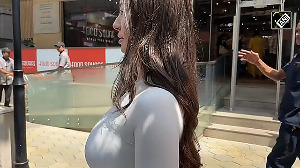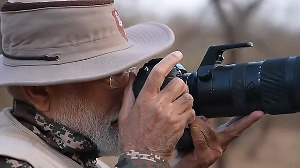
Sohail Abbas met his profession and art by chance.
Born in a cricket-playing family, he started playing hockey on the school fields of Karachi for fun. Then pleasure became passion, and the game started to define him.
Once on the hockey turf, all Abbas wanted to do was score goals. He started as a striker, but when the coach relegated him to the line of defence, he found a way to script his destiny. He became a drag-flicker and went on to leave the international stage as the best there ever was.
Abbas worked hard till he started defining the art.
On the platter are these records: most number of international goals, most number of Olympic goals, most number of goals in a calendar year and the fastest to 100 and 200 goals.
Sports Correspondent Deepti Patwardhan met the 29-year-old Pakistani ace during his visit to Hyderabad to participate in the Premier Hockey league.
You were the crowd favourite during the PHL despite India's best players being there.
The PHL was a very good experience. It is good for friendship between the two countries. I feel that people here (India) love me more than they do in Pakistan. It is like a fantasy to think that people from India adore me so much. It is also a dream that India and Pakistan should combine and play as one team.
Why did you retire from the game so early?
When I started hockey I always thought I'd retire when I'm at my peak. I've seen many captains and players play till the federation keeps them out. I think you must retire when you are on top; it's lasting.
Also, I have always said I will play for Pakistan if the team needs me during the Olympics or World Cup.
I was thinking that, maybe, after I break the world record, which I was hoping would come in Pakistan -- but unfortunately or fortunately it came in India -- I would retire. I did not tell it to anyone, but decided about it, maybe six or eight months back.
Will you continue to play in the foreign leagues?
Yes, I am here because of hockey. I will never stop hockey. I will try to learn more and more for my club, country and myself. If you want to learn the different cultures of hockey, you have to play in different leagues. When I am on the ground there's an atmosphere of hockey, just like if I would go to a library if I wanted to learn.
You've played in the Dutch and German leagues. How do you blend the different styles of hockey?
It is up to the players to adapt to the differences.
During my first tour in 1999 to Amstelveen, Holland, I was actually watching my first match on the field. I did not know what was happening. I did not know what were the positions, and there was the problem of language too. I did not understand what they were saying. I was just running here and there. It was really difficult. But things improved afterwards.
-
Also read: The Adivasi who became King
The way the Europeans play is completely different. It becomes more of an intellectual game with them. It was a sort of plan they gave me and I had to stick with it. They locate the ball and know where it will be in the next five minutes. It was like reading a book before the game and applying all those things in the match.
Did you start as a drag-flicker?
 No, I was a forward. I loved to score goals. But I wasn't a very good forward, so my coach said that with your built and body language you will stay back and play as a defender. I did not know where the goals would come from.
No, I was a forward. I loved to score goals. But I wasn't a very good forward, so my coach said that with your built and body language you will stay back and play as a defender. I did not know where the goals would come from.
I saw some movies of some players and learnt a lot from them.
When I was starting, lots of people -- coaches and players -- were against me. In Asia it is always like that. When you are going up lots of people want to pull you down. I loved that they were pulling me back; it meant that I had something in my game.
I did not have any coaching because drag flicking was just starting in Asia. It was difficult at that time because even I did not know what to do. But it clicked for me. Even after the hard work, the ability, I think, is a gift from Allah.
Was the Athens Olympics your biggest disappointment?
The only regret I have is not winning a medal for Pakistan.
But I think we always get what we deserve. The training, the way we plan I think we deserved the fifth position at the Olympics. We always think of gold. I don't think we deserve the gold medal in the Olympics anymore. When we don't get the gold we are very disappointed. We don't realize that there are very good teams and fourth or fifth is not a bad position. We should have realistic goals.
During the Olympics you had said that India and Pakistan should stop playing against each other.
Playing against each other may be good to change the attitude towards the contest, but as far as the players are concerned we don't learn much. The way the Europeans play, we'll learn a lot by playing against them.
Why is India goalkeeper Adrian D'Souza so successful against you?
He is very good at blocking field goals because he runs very fast. As far as the short corner is concerned, though he is good, I always think there is difference between stopping the ball by charging out and stopping the ball from a flick or hit on the goalline. It requires more courage to stop the ball at your post. Adrian is also more satisfied when he stops the ball at the post. There were times when even I got worried.
Charging out was a clever tactic by Adrian. It would block my vision of the goal. But he can't do that forever. The basics of goalkeeping will always teach you to stop the ball in the goal.
He is young and a very good 'keeper. In a couple of years he will be the best in Asia.
How will the new rule of reducing the depth and the length of the bow of the hockey stick affect drag flickers?
The bow helps the short corner specialist to hold and flick the ball faster. The Europeans make rules for their safety. Nobody from Asia is saying anything; I don't know why.
The reason they gave for this new ruling was that it is dangerous for the kids. They say when they are playing on the ground the ball rises and it is dangerous and doesn't help them improve their hitting. I don't think that's a valid justification.
There used to be a rule of not bringing in the short corner specialist. But when we started getting players like Pargat Singh and Khalid Bashir, the FIH broke the rule allowed that. Then they said you have to stop the ball outside the 'D'. When we were improving at that they said you can stop the ball anywhere. Now since we are getting better at the short corner they want to bring in this rule of reducing the depth and length of the bow.
But there is plenty of talent in India and Pakistan; no matter what rule changes are made, we'll manage it.
Headline image: Imran Shaikh
Photographs: Getty Images







 © 2025
© 2025